Recently, I let my kids watch ALL of the Harry Potter movies before reading ALL of the books. I know some parents don’t allow this.
Do you?
Looking for comments on both sides of the debate!
Recently, I let my kids watch ALL of the Harry Potter movies before reading ALL of the books. I know some parents don’t allow this.
Do you?
Looking for comments on both sides of the debate!
There’s some debate if Facebook helps anyone at all.
A good friend of mine who is also a great writer recently turned off her Facebook in order to complete a major project. It was a good decision for her because she knows that like many of us, social media can be distracting. It is so easy to sit on Facebook (or other social media) and scroll through my feed laughing at funny posts, rolling my eyes at overly dramatic posts, burning with rage at posts about injustice, and trying not to cry at moving, uplifting posts. And for some people, Facebook is more than distracting, it’s detracting. It makes them feel downright bad.
It is a lot easier to scroll than tackle tough writing tasks. So why don’t I eliminate Facebook from my life all together?
Because like any good optimist, I think there is some good in everything. Even Facebook.
I spent a great day yesterday working with a creative friend yesterday who wondered if Facebook really was useful for her. Also this month, one of my favorite clients has reached out to me to ask for two presentations on social media, one for beginners and one for advanced users. So I’ve been thinking a lot about how social media like Facebook can be useful.
People share stories on Facebook, and writers need stories. Facebook helps with inspiration! No, I don’t suggest you steal people’s life stories for your next novel, but I do suggest thinking about motivations and background and choices. Use what you read about how people to act to make your characters seem as real as possible.
Hello, critique group! Yes, you can connect with other writers and conduct a pretty decent critique group via Facebook. And if you get into a great professional writers’ group you can also learn valuable info on how to pitch your work. Just make sure you give as much as you get. Remember, online networking can be a lot more effective if you also incorporate some IRL (in real life) experiences.
Facebook helps you gain knowledge, if you use it right. Go beyond just liking friends and find some pages that feature information on different cultures, or foods, or skills. Like them. Learn form them!! Maybe push yourself to go to new events that you discover online and learn about yourself, too.
As a writer, use Facebook and other social media to write as funny as you can as succinctly as you can. Humor works well on social media and helps you practice your craft. As a reader, find some joy in the world. Think about what it is that people love to read about and include these elements in your stories.
Sometimes all we need to do is post our goals in public to help us reach them. Once you have a good core group of friends, you can ask them to help you stay accountable. Just don’t forget to lend the same support to other writers who also need that nudge.
Facebook helps writers get writing work – sometimes. It works for some people, but it’s not the best way to land great gigs and it should never be your only way.
There are lots of ways to use social media for your benefit. But I think a big part of using social media the right way is to think about your goals and identify drawbacks. I have turned off notifications and only go on social media during designated times during the day when I don’t have other obligations. I also monitor my usage on RescueTime so I can find out if I’m cheating!!
What ways do you find Facebook to be helpful?
You can also check out my article about how Pinterest can be less about procrastination and more for productivity.
This is a post of mini-updates about writing.
2. I was super excited to discover that my local library has an entire shelf full of the Newbery Award winners! The only challenge is that these specific books can’t be checked out.
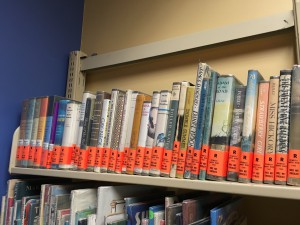
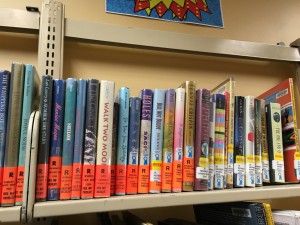
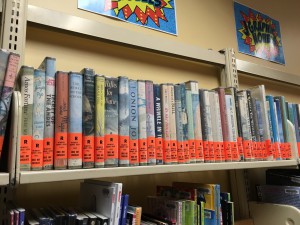
I’m also working on getting a poster that I saw in the library. Super exciting because I feel like I just discovered a tool to help me reach my goal!
3. I also discovered another thing about myself as a writer. I’m in a writing community right now that’s very focused on pitching freelance articles to online outlets and I have found myself increasing my pitching frequency! But I realize that I’m doing that because I’m responding to the vibe of that group. No one is peer pressuring me, I’m peer pressuring myself. But I think it’s good to be working on a variety of writing types and to recognize this aspect of my personality.
4. I set my writing goals (finally) for this year. One of them is to write a really good personal essay and get it published. I have several topics in mind. Stay tuned!
I’m struggling with characters in my story and their jobs. I think I have one main character and one protagonist. But I was thrilled to find this post from elements of cinema that provides great examples of stories where the main character isn’t always the protagonist, or the protagonist isn’t clear until deep into the story, or even complex stories with an ensemble cast each going through their own struggle.
I’m working on my bee story and I want my protagonist, the one who chooses, to be my queen been.
I loved finding this post online outlining the differences between MC and Protagonist. The post author says that the main character of The Great Gatsby is the narrator, Nick (who isn’t even mentioned in the Amazon review!!!!) while the protagonist is of course, Gatsby.
What is the job of the main character? Is just it the narrator? Not exactly. According to another writing blog I found, the main character is the one through which the reader experiences the story. The protagonist is pursuing the story goal.
So with that distinction clarified, I have decided I want my main character to be a worker bee, one who has the job of Forager. She can do tasks that set my protagonist up for the choice that is essential to the story. My main character will also have a choice or two.
Ensemble Cast
I love the idea of an ensemble cast. I’m not looking to create anything as epic as Game of Thrones, but I think I could possibly produce something approaching the Breakfast Club, where the different honeybees come together to save their Hive, which is sort of a character on its own.
http://www.publishingcrawl.com/2014/02/17/tips-for-creating-an-ensemble-cast-of-characters/
Now I have a problem when it comes to antagonist. I had several problems facing my sweet sister honeybees:
But I didn’t actually develop a character as antagonist. I have nameless foes. I have internal conflict and external conflict, but no villain. I’m thinking I need one.
I found this site gives three good elements: vulnerability, believability and invincibility.
Part of me is thinking a drone might make a good villain. A drone would want the natural order of the hive disrupted. A drone is born only to mate with the queen and then lives off the food produced by the workers and then kicked out to die as winter arrives. A drone who likes the sweet life might not want to be kicked out to die as winter arrives. He might look for a queen who is willing to change the way she lives so that he can live his lazy, luxurious life a little longer. He might feed her desire to make her own decisions. I think he could be a good tempter who tries to entice her to give in to her selfishness…which would lead to the end of the Hive. Ok, I think I have my villain.
For more lists about villains, here are five elements. I like intelligent.
I’ve been keeping track of my writing submissions, rejections, and acceptances in a fancy little notebook for the past three years.
In a private Facebook group, I recently participated in a discussion about how much money other full-time freelancers make annually. Many of them are doing full-time journalism and copywriting and not trying to make it as fiction writers. While I keep track of my financials, I was inspired by this discussion to analyze the volume and success rate of my pitching.
So I launched into the analysis of my submissions, rejections, and acceptances. Now, even though someone I love very, very much is like and expert on Numbers, charts, and graphs, I’m not so much of an expert. So I started out very simply with a numeric chart. Later I might try pie charts and bar graphs. Also, later I might analyze my non-fiction versus fiction rates. But at this point, here are my basic numbers.
One of the hardest tasks I had in making these charts was choosing a color for each year. I don’t exactly have an eye for design, so I decided to use the Pantone colors of the year!
So it looks like 2015 was a good year in terms of overall volume. I did better on my amount of submissions and, probably logically, did better in terms of acceptances. There’s also a definite bell curve in terms of what time of year I am most productive with submissions.
For 2016, I hope to maintain a steady rate of submissions even over the summer. I’d also love to hit at least 10% of acceptances for the year.
Do you keep track of your submissions, rejections, and acceptances? Have you ever analyzed your success rate?
I juggle a lot of projects simultaneously, but every once in awhile I dive in full force on a project and decide to work on it until it’s ready to go. I’ve kind of dabbled on a certain story about bees for awhile. Back in April 2014, I went on an SCBWI writing retreat back and jotted down the basic outline. Throughout 2014 and 2015 I’ve read lots of books about bees. In 2015, I went on a bee walk!
But this year I’ve gone ahead and committed myself to finishing the full draft. I’m over 15,000 words into the first full draft. My final word count goal is around 35,000 so I’m close to halfway. The number of bees in a hive actually outnumbers the words in my manuscript.
Which brings me to my next question and it’s not about bee science. It’s actually “who is my main character?” It’s pretty hard to pick one main character out of a hive of 50,000 bees.
It’s also hard to write animal, or in this case, insect dialogue. It has to be just right to be believable. As another part of my research, I’m reading some of my favorite animal fantasy books Watership Down and Mrs. Frisby and the Rats of NIMH.
Right now when I need a break from writing new chapters, I go back and work on fine-tuning the first two pages. I want to strike the right balance between description and setting the scene in the hive, some dialogue to draw in younger readers, and establishing a page-turning problem. At a recent critique group I was told that I didn’t make it obvious enough that I was writing about honeybees. I felt a little defensive about the comment, though, because when kids pick up a book they will see (hopefully) a bee on the cover, read a blurb on the back of the book, read the tagline, etc.
Despite that, I decided to take a look at the first two pages of these books.
So there’s no dialogue here but there is a big problem presented right on the first page. And the words “field mice” are mentioned right in the first sentence.
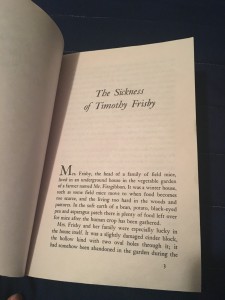
Here’s the first page of Watership Down. Rabbits aren’t mentioned until the third sentence, and it’s not even clear that this story is about rabbits. Unless you look at the front cover, then you get a clue that the story is about rabbits! There really isn’t a problem clearly stated here on the first page unless you really think deeply about the quote from Agamemnon and know something about the role of Cassandra.
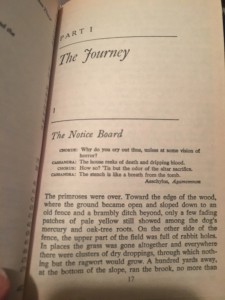
On both first pages, there’s really a lot of detail about the natural setting. I love that about these books. I feel really dropped into the scenery and the experience of the main characters. That’s really essential to the animal fantasy in my opinion. I’m definitely going to focus on that aspect of writing in my bee story.
We’re into March of 2016 and I feel like I’m finally starting to tackle my “read all the Newbery Medal Books” project. I was stalled at the beginning of the year because I wanted to finish Ulysses. While that book is an excellent but very long read. Then in the process of researching the biology of the Sargasso Sea, as well as the migration of eels and monarchs, I stumbled across an amazing book of Rachel Caron’s writing called Lost Woods.
If you’re interested at all in nature, science writing, or the power of the written word to influence public policy, I highly recommend this book. There are passages in there that are still relevant today, even though they were written half a century ago.
But then I finally started those Newbery Medal books I’ve been collecting! So far this month I read King of the Wind, The Witch of Blackbird Pond, and I’m almost finished with Julie of the Wolves.
I enjoyed King of the Wind for its sensory details and historical and cultural information. I started with this book because I am working on an animal story myself and because I’ve read Henry’s Misty of Chincoteague and have fond memories of that book.
I knew I’d love Julie of the Wolves because I loved Jean Craighead George’s My Side of the Mountain. I recently re-read that book last year and still love the idea of leaving civilization for the wilderness and living off the land and in tune with the natural world. I don’t think it’s quite the lifestyle for me, but I love the escapism offered by these books. Julie of the Wolves offers even more as she lives in the tundra. It’s a world so foreign made so real by Craighead George.
Picking up The Witch of Blackbird Pond was an emotional moment for me. This book represents some tough coming of age experiences for me. Like a lot of kids, I struggled in my sixth grade year. I went to a small school and unfortunately my sixth grade teacher was the mom of a girl in my class with whom I didn’t quite get along with at the time. We had been friends in second grade, but by sixth we weren’t. Anyway, for some reason or another I was put in the lowest reading group that year. Me! I wasn’t good at a lot of things in middle school, but I was really, really good at reading. I have no memory of what book my group read, but I know the highest reading group read The Witch of Blackbird Pond. I was very bitter about this unfair grouping. I held a grudge against this teacher and this book. Now that I’m 40, I decided it was time to read this book and move on with my life!! I did enjoy it and now I want to visit the town of Wethersfield in Connecticut.
More Newbery Award books to come!
Sometimes it’s really hard to tell if I should finish a story. I have several writing projects happening all at once. Some are non-fiction articles I’m researching, some are fiction stories I’m writing. Since most of the stories aren’t on assignment but are things I’ve decided to work on during my own time.
I jump around from project to project. If my energy starts to ebb on a certain story I usually don’t feel bad switching to another story. But if it sits neglected too long I start to feel a little guilty. I’m not saying that every project is worth something. For instance, I don’t think “Santa’s Best Friend” is going anywhere. That’s just a feeling, though, not an objective assessment.
I confess to having a little bit of worry about this. What if I keep starting stories but don’t finish any? Does that make me seem less productive? Or like I have no follow-through? I often feel really compelled to finish things that I start, just to prove I can.
But maybe that’s not the best use of my time. Maybe it’s better to stop working on stories that aren’t working.
I don’t really have a rubric for deciding if a story is worth finishing or not. It’s often just a vibe or a guess. So how do other writers know they should finish the story?

I know just how Melissa feels.
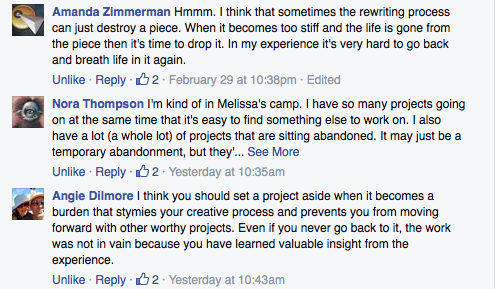
There’s quite a few different approaches there. It seems like not a lot of writers don’t mind giving up on certain projects when they aren’t feeling it.

I certainly don’t want to work on something that makes me nauseous.
Fellow writer Denise offers four times for writers to know when it’s time to give up on a story.
So when do you know it’s time to stop working on one story and start on another?
Looking for some favorite new recipes for picky eaters in your house? Each of my kids can be picky eaters at one time or another. But even when they are picky, I can usually rely on three solid and healthy meals or snacks that each one will devour without question.
I like to make food fun but also encourage my kids to try new things without making it too elaborate. I don’t like to hide healthy foods in less healthy foods, because that undermines their trust in me.
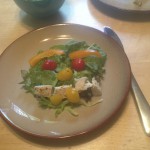 Monster salad – this one’s easy. Grab your favorite collection of salad ingredients. Add in some new ones that have an interesting appearance and set them out on the counter or table. For a picky eater bonus, take your child shopping and let them pick out a fruit or vegetable that neither of you know and try something new together! Invite your child to make a monster face using their ingredients! Then find some fun monster eating weapons like tiny forks or toothpicks. If you can handle a little mess, allow the picky eater to use their hands so they can get familiar with the texture of the food first.
Monster salad – this one’s easy. Grab your favorite collection of salad ingredients. Add in some new ones that have an interesting appearance and set them out on the counter or table. For a picky eater bonus, take your child shopping and let them pick out a fruit or vegetable that neither of you know and try something new together! Invite your child to make a monster face using their ingredients! Then find some fun monster eating weapons like tiny forks or toothpicks. If you can handle a little mess, allow the picky eater to use their hands so they can get familiar with the texture of the food first.
 Pizza on a stick – this is a classic kids’ favorite deconstructed and represented in a new way. Help kids understand that familiar foods are made up of basic ingredients. For this recipe you can even grow the tomato and basil and get your picky eater involved in cooking and cutting and chopping. Start with some thin crust bread that resembles pizza dough. Slide it on a stick (eating things without a plate can make old foods more interesting) and then slide on tomatoes, cheese and a basil leaf. What other pizza toppings can you and your child add? Let your picky eater get creative and choose fun things for you both to try.
Pizza on a stick – this is a classic kids’ favorite deconstructed and represented in a new way. Help kids understand that familiar foods are made up of basic ingredients. For this recipe you can even grow the tomato and basil and get your picky eater involved in cooking and cutting and chopping. Start with some thin crust bread that resembles pizza dough. Slide it on a stick (eating things without a plate can make old foods more interesting) and then slide on tomatoes, cheese and a basil leaf. What other pizza toppings can you and your child add? Let your picky eater get creative and choose fun things for you both to try.
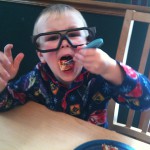 Pineapple with cinnamon – this sweet treat was introduced to us by Argentinian friends. I love how it encourages kids to combine two known flavors and try them out together. This dish is also a great way for picky eaters to try foods at different temperatures and think about how it changes the flavor. To serve it warm, grill the pineapple then sprinkle with cinnamon. Serving the pineapple cold or even room temperature will appeal to different taste buds. What other spices might taste good sprinkled on pineapple?
Pineapple with cinnamon – this sweet treat was introduced to us by Argentinian friends. I love how it encourages kids to combine two known flavors and try them out together. This dish is also a great way for picky eaters to try foods at different temperatures and think about how it changes the flavor. To serve it warm, grill the pineapple then sprinkle with cinnamon. Serving the pineapple cold or even room temperature will appeal to different taste buds. What other spices might taste good sprinkled on pineapple?
Don’t forget to keep track of your favorite new recipes for picky eaters in a copy of My Food Notebook and make mealtimes more fun with Fresh Fun Food Ideas for Kids.
If you want to be a writer, for children or otherwise, it’s really important to find a writing critique group. Right now, I’m a member of three different writing critique groups and each one has it’s own flavor, pros and cons.
There are lots of ways to find writing critique groups online, but if you’re interested in writing for children I suggest starting with the Society of Children’s Books Writers and Illustrators. My chapter, the Western PA chapter, has a decent list of groups listed on their website.
For writers in and out of Pennsylvania, there are lots of ways to find writing critique groups through Pennwriters. I’m in Area 3, and there are six different groups available to members.
If you can find a writing critique group in your area, you can create a critique group yourself. Ann Whitford Paul has useful suggestions on building one in her book Writing Picture Books: A Hands-On Guide from Story Creation to Publication. She outlines rules about timing, reading stories aloud, and not speaking while others are critiquing! It’s really useful stuff.
While an in-person group is by far the most valuable, in my opinion, it’s also possible to get useful critiques online. If you can’t find a writing critique group in your town or can’t build one, you can go online and join Scribophile and get some really useful feedback. The only requirement, just like belonging to an in-person group, is that you also give critiques to others.
No group is going to be perfect, without it’s strong personalities and hurt feelings. It’s unavoidable when we’re sharing things as personal as our stories! But it’s worth it. The feedback I’ve gotten from groups has been invaluable.
How did you find a writing critique group?
What are things that work best in a critique group, in your experience?